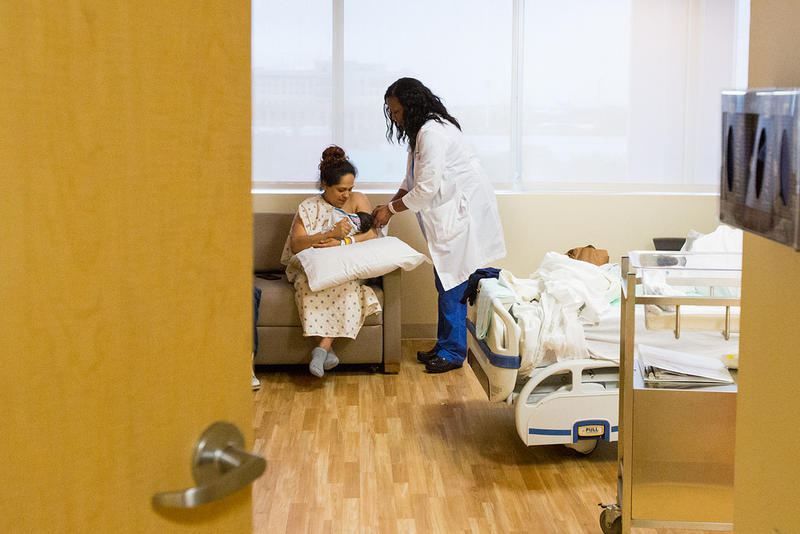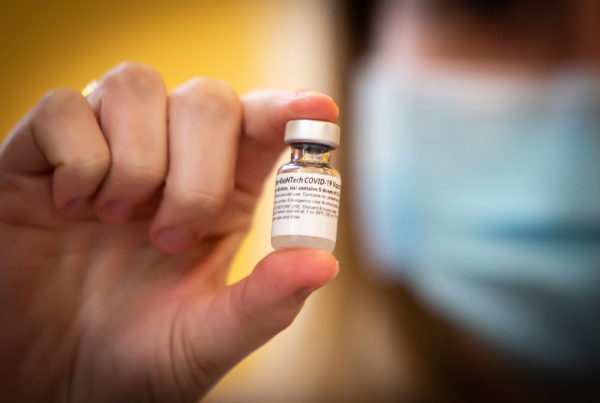Interview produced by Alexandra Hart.
Texas mothers on Medicaid could keep their health coverage for half a year after giving birth, instead of just two months, under a bill passed by the Senate early Thursday.
Maternal health advocates said the bill — originally pitched as a one-year extension — could reduce the state’s maternal mortality rate and offer vital help to mothers with conditions like postpartum depression or health complications in the months after giving birth.
Medicaid covers low-income women from pregnancy until two months after delivery, although a third of maternal deaths have happened 43 days or more postpartum in Texas. Black women die disproportionately while pregnant or after delivery, according to state reports.
The six-month extension in the Senate’s version of House Bill 133 is stingier than a proposal overwhelmingly passed by the House earlier this year, with the backing of the Republican House speaker. That would give mothers a full year of postpartum coverage in line with recommendations from experts and a state committee devoted to studying maternal mortality.
The changes will likely be negotiated by lawmakers behind closed doors.
The proposal stands to affect tens of thousands of women in Texas, which has the largest number of uninsured residents in the nation. About half the babies in Texas are born to mothers on Medicaid — about 181,000 in 2018.
Many of those women don’t qualify for Medicaid in Texas before or after their pregnancy because the state has the strictest income eligibility limits nationwide, according to the Kaiser Family Foundation.
“With our choice here, I choose women and women’s health,” said state Sen. Lois Kolkhorst, R-Brenham, the bill’s sponsor. “The media has portrayed our version of this as cutting it from 12 [months] to six. I want to make sure that we clarify that that we are adding four months and we will become one of the first states in the nation to extend it beyond two months.”
The federal government requires states to offer two months of postpartum coverage to mothers on Medicaid, though several states have sought to extend that to a year.
In the 38 states that have expanded Medicaid, mothers making 138% of the federal poverty level — about $3,000 per month for a family of four— can keep qualifying for Medicaid as a parent after they give birth. In Texas, one of a dozen states that have opted not to expand Medicaid, parents must make well below the federal poverty level to qualify for Medicaid — about $200 a month for a mother with one child.
The Senate’s version of the bill is expected to cost the state $49 million in 2026, once it is fully ramped up. The more expansive House measure is projected to cost under $90 million that year.
Experts and studies have found the maternal mortality rate is higher in the U.S. than other high-income countries, and that many maternal deaths are preventable. A state report found suicide, drug overdoses and heart problems among the causes of pregnancy-related deaths in Texas.
Dr. Lisa Hollier, chair of the state’s Maternal Mortality and Morbidity Review Committee, previously told The Texas Tribune there are complications like heart disease and mental health conditions that are more likely to happen well after delivery.
“It’s really important that women have access to the full range of services … like emergency room visits, like hospitalizations, that can really help them recover from their heart conditions, for example, or recover from their postpartum depression,” Hollier said.
There is a Texas program, HTW Plus, that gives mothers one year of coverage for mood or substance use disorders, diabetes, asthma and cardiovascular disease. Hollier said it is a “package of outpatient services” that are helpful but limited. Medicaid provides the same services and additional medications, testing and hospitalizations not covered by the state program, she said.
Advocates have said the state program has almost no network of specialty or mental health providers to deliver those services.
Maternal health advocates also say women who were previously uninsured might learn they have undiagnosed health problems while pregnant and receiving Medicaid coverage, but be unable to treat the issues before their coverage runs out.
House authors of HB 133 said they were disappointed the Senate’s version extended health coverage for six months instead of 12.
“All of the recommendations from the [health commission] and the maternal mortality and morbidity task force committee — the recommendations were 12 months,” said state Rep. Toni Rose, a Dallas Democrat and author of the House proposal. She said earlier this week that she did not plan to immediately accept the Senate’s proposal and wanted the full-year coverage “restored.”
“I am still just a little bewildered as to why the arbitrary cut off of six months was put in,” another author of the House proposal, state Rep. Shawn Thierry, D-Houston, said after the change was unveiled last week. “If you’re concerned about costs I would just once again repeat that by providing health care coverage for 12 months for women after giving birth, you’re actually reducing pressures on our healthcare system in Texas because we know that if women get the proper care early on it reduces complications, it reduces hospital stays, it reduces other diseases and it reduces deaths.”
Other maternal health advocates welcomed six months of health coverage for new mothers but said it was not enough.
“An additional four months is certainly better than cutting off moms 60 days after childbirth, but the evidence is clear that treating moms’ physical and mental health conditions for a full year after childbirth is critical to their health and their baby’s development,” said Stephanie Rubin, the chief executive officer of advocacy group Texans Care for Children.
Cindy Zavala, 19, said six months wasn’t long enough to address health concerns that come up after giving birth.
The El Paso resident delivered a son, Leonel, in November 2019 but returned to her doctor half a year later with pain in her bladder. She decided to wait the pain out — thinking it might have been caused by carrying the baby, or an intrauterine device she’d had inserted and removed after delivery. But the pain didn’t dissipate until her doctor gave her birth control pills last fall.
Zavala still had health coverage because the federal government temporarily stopped states from kicking new moms off Medicaid during the coronavirus pandemic.
She’s not sure what she would have done without it.
“When you’re breastfeeding, you still have a lot of hormones going through your body, so there’s still a bunch of things that happen to the mother’s body way after six months,” she said.
The bill, as modified by the Senate, also weaves in provisions from a separate measure that would move Medicaid case management for kids and pregnant women to a managed care model. It makes a similar change with the state’s Healthy Texas Women program.
The passage of HB 133 comes after lawmakers passed on a broader effort to expand Medicaid to working poor Texans, a move longtime proponents say would let people better access preventive care rather than falling back on costly trips to the emergency room. Opponents say Medicaid is a poorly managed program and not financially sustainable.
A federal relief bill passed earlier this year incentivized states to extend postpartum Medicaid coverage to a year, by waiving a lengthy and cumbersome process they would normally have to go through. It’s unclear if the streamlined process holds for the six-month extension.














